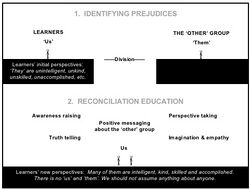Reconciliation education
Topic: Social
 From HandWiki - Reading time: 3 min
From HandWiki - Reading time: 3 min

Reconciliation education is a teaching-learning framework for improving participants' attitudes toward other groups of people, developed in Australia by Adam Heaton.
Background
The term reconciliation relates to race relations in this context, as used in various countries around the world, including Australia.[1][2][3][4][5][6]
Reconciliation education was developed by Adam Paul Heaton based on findings from his 2014 PhD study.[7][8][9] The study found that as Australian Grade 8 students engaged in a positive discourse about Aboriginal Australians, they developed more positive attitudes toward the other group.[10]
Description
The educational framework is aimed at improving attitudes and relationships among different groups of people.[7][11] The other group may possess characteristics diverse from participants' own, such as a different ethnicity, religion or political affiliation.[12] Participants engage in awareness-raising, truth-telling, perspective-taking, imagination and empathy as they consider a positive discourse designed to counter negative and prejudiced attitudes toward the group (see Figure 1).[13][14]
Points of commonality exist with allophilia[12] and reconciliation.[15][16]
See also
- Reconciliation in Australia
References
- ↑ "About Us". https://www.reconciliation.org.au/about-us/.
- ↑ Mulholland, Malcolm (11 May 2016). "New Zealand's indigenous reconciliation efforts show having a treaty isn't enough". http://theconversation.com/new-zealands-indigenous-reconciliation-efforts-show-having-a-treaty-isnt-enough-49890.
- ↑ Sullivan, Ann (2016). "The politics of reconciliation in New Zealand". Political Science (Informa UK Limited) 68 (2): 124–142. doi:10.1177/0032318716676290. ISSN 0032-3187.
- ↑ "Home page". https://reconciliationcanada.ca/.
- ↑ Maddison, Sarah (16 May 2016). "Indigenous reconciliation in the US shows how sovereignty and constitutional recognition work together". http://theconversation.com/indigenous-reconciliation-in-the-us-shows-how-sovereignty-and-constitutional-recognition-work-together-54554.
- ↑ Brzozowski, Alexandra (7 April 2021). "Nordic countries set up Sámi reconciliation commissions to investigate indigenous injustices". https://www.euractiv.com/section/arctic-agenda/news/nordic-countries-set-up-sami-reconciliation-commissions-to-investigate-indigenous-injustices/.
- ↑ 7.0 7.1 National Library of Australia (2013). ""I stopped to think" Aboriginal anti-racism pedagogy in middle school / Adam Paul Heaton.". https://trove.nla.gov.au/work/191561064.
- ↑ North Queensland Register (14 October 2014). "Positive results for anti-racism curriculum". https://www.northqueenslandregister.com.au/story/3366979/positive-results-for-anti-racism-curriculum/#!.
- ↑ News24 (17 October 2014). "Government not serious about racism – Aus teacher". https://www.news24.com/News24/Govt-not-serious-about-racism-Aus-teacher-20141017.
- ↑ Heaton, Adam (2018). "Kids can show prejudice and teachers can show them another path". Issues in Educational Research 28 (4): 940–954. http://www.iier.org.au/iier28/heaton.pdf. Retrieved 17 July 2020.
- ↑ Charles Darwin University (December 2013). ""I stopped to think" Aboriginal anti-racism pedagogy in middle school". https://researchers.cdu.edu.au/en/studentTheses/i-stopped-to-think-aboriginal-anti-racism-pedagogy-in-middle-scho.
- ↑ 12.0 12.1 Pittinsky, Todd (2013). "Allophilia—a new framework for understanding effective intergroup leadership". http://www.centerforpublicleadership.org/?option=com_content&task=emailform&id=267&itemid=2.
- ↑ Heaton, Adam (2020). "Closing the gap between 'us' and 'them': The role of perspective taking and empathy in Reconciliation Education. International Journal of Arts and Social Science, 3(4), 52-8". http://www.ijassjournal.com/2020/V3I4/41465752101.pdf.
- ↑ Heaton, Adam (2020). "Reconciliation Education: A new conceptual framework for interrupting prejudices and developing positive inter-group perspectives. International Journal of Education Humanities and Social Science, 3(2), 223-227". https://ijehss.com/uploads2020/EHS_3_102.pdf.
- ↑ "Let's Bust Some Myths". 2018. https://www.reconciliation.org.au/lets-bust-some-myths/.
- ↑ Heaton, Adam (2020). "Combatting racism to create a better Australia: the potential of the national cross-curriculum priority of teaching Aboriginal histories and cultures". Australian Aboriginal Studies (1). https://aiatsis.gov.au/publications/products/australian-aboriginal-studies-issue-1-2019. Retrieved 17 July 2020.
 |
 KSF
KSF